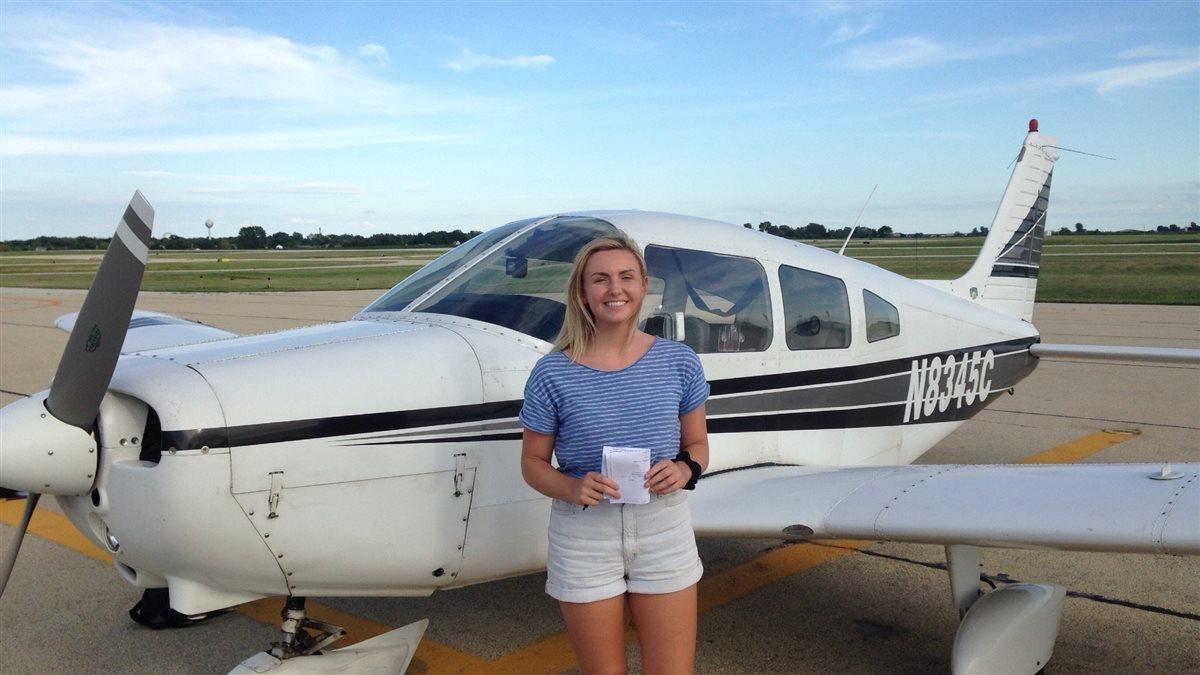Instructor Report: Taking charge
Taking your ticket to new flight levels
By Erin Johnston
Instructors who have taught family members know it is both a blessing and a curse. As a new instructor, I found my sister Delaney’s direct and honest feedback valuable: “Shhh, stop talking and let me think,” “I don’t understand; explain it differently.” I knew she wouldn’t be afraid to tell me she needed time or didn’t understand something. However, I would later discover my familiarity with her would blind me as an instructor. She was my easiest and most difficult student.

Before I took over Delaney’s training, she had already soloed a couple times. In order to get a grasp of how she was flying, we initially did maneuvers, takeoffs, and landings. She handled the airplane gently; her landings were always safe; and her radio communications were short, sweet, and to the point. She manipulated the airplane with ease.
We then moved forward with cross-country training. Delaney initially struggled with chart reading and diversion calculations. But after weeks of practice, I could tell she was ready. The problem was, she couldn’t.
Delaney has always struggled with self-doubt, so I wasn’t as concerned about this as I should have been. I told her, “Relax, remember your training—you’re ready.” It helped for Delaney to hear that her instructor thought she was capable. She completed her solo cross-countries without any issues. She seemed more confident after they were finished.
At this point, she had all the hours necessary for the certificate. Delaney flew the airplane very well, so, as anticipated, we did not spend much time fine-tuning her flying skills. What I couldn’t seem to shake, though, was her pilot-in-command mentality—or lack thereof.
Throughout her training, Delaney would express minor insecurities: “We are 10 miles from DuPage, right?”, “I’m going to call Aurora now, OK?”, “The frequency is 121.8, right?” Anytime she communicated with the control tower, her head swiveled to her right immediately after her calls. She needed confirmation she was correct. Initially, I assumed that if I kept telling her she was right, she would get over her insecurities. Wrong. My constant assurances were hindering her ability to make the assessment herself. It wasn’t until we were on a mock checkride that it finally clicked.
 Typically during Delaney’s training, I would tell her to depart to the south and climb to 3,200 feet. She would practice the maneuvers, and I would critique afterward. When we were done, I would say, “OK, let’s head back to DeKalb” while subconsciously looking and pointing where we should go.
Typically during Delaney’s training, I would tell her to depart to the south and climb to 3,200 feet. She would practice the maneuvers, and I would critique afterward. When we were done, I would say, “OK, let’s head back to DeKalb” while subconsciously looking and pointing where we should go.
However, when we completed the mock checkride, I only told her to take me home. She looked at her sectional for awhile before admitting she didn’t know where we were. Initially, I assumed I had turned her around with the maneuvers. I pointed out roads and a lake below us and asked if she could identify where those were on the chart. She pointed to a road and a little lake 15 miles north of the airport when, in reality, we were 20 miles southwest of the airport. That’s when I realized how little she had been paying attention to where we were. When I asked what direction we had been going during these maneuvers, she couldn’t recall.
We had recently finished practicing lost procedures and how to properly use the GPS, so I wasn’t concerned with Delaney’s ability to find her way around if she were to use all her resources. What concerned me was her lack of personal responsibility when I was in the right seat. I realized my subtle cues and assurances were, in fact, crutches.
Starting with our next lesson, I had her treat me as a naïve and curious passenger. After every maneuver, I would ask her where she was. When she would say, “We are 10 miles to the north of DeKalb, right?” I would respond, “I don’t know, are we?” If she was unsure of herself, I had her rely on outside resources to replace my assurances: “Did he clear us to land?” “I don’t know. Ask him.”
This started to work. I witnessed her demeanor changing. Situational awareness and self-assurance were huge contributors to confidence and, in turn, a PIC mentality. After she had completed what I would refer to as her “PIC training,” she told me when she was ready for her exam and passed her checkride with flying colors.
Overall, I have learned an incredible amount from training my sister, and I was lucky to have parents who trusted my training and didn’t push to get her finished early. This experience has helped me find my voice as an instructor.
I look at my sister now and she is a completely different person. She exudes confidence and maturity. I can’t help but think this flight training experience made her the person she is now. This goes to show the flight training environment allows the student and instructor to experience a great deal of personal growth.
Erin Johnston is a flight instructor based in West Chicago, Illinois.


